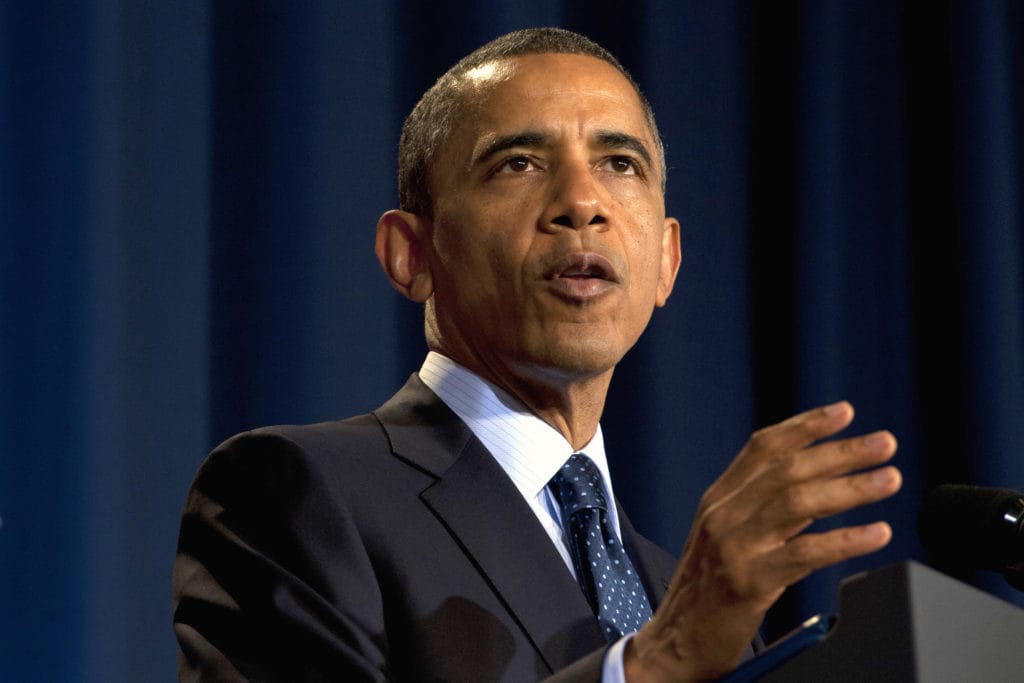The war on drugs seems to be grinding to a halt across the U.S., thanks to legislation enacted in Colorado and Washington allowing the legal sale of marijuana and an apparent nationwide shift in opinion on the subject. Now, as the first legal, retail store purchases of marijuana are getting underway in Colorado, New York Gov. Andrew Cuomo plans to allow 20 hospitals in the state to prescribe marijuana to patients. The times may be changing, but is the new-found liberal attitude toward marijuana a sign of things to come, or is pot a special case in comparison to other drugs? President Barack Obama has now weighed in on the issue. In an interview with the New Yorker’s David Remnick published Sunday, Obama said he doesn’t believe marijuana is any more dangerous to one’s health than alcohol. The president added, however, that smoking marijuana is not something he would encourage. Two days later, former Rhode Island Rep. Patrick Kennedy said the president has gotten it all wrong. “I think the president needs to speak to his NIH director in charge of drug abuse,” Kennedy said on MSNBC’s “Hardball” on Monday night. “[She] would tell the president that, in fact, today’s modern, genetically modified marijuana [has] much higher THC levels [that] far surpass the marijuana that the president acknowledges smoking when he was a young person.” The higher TCH content is also a concern to Dr. Stuart Gitlow, who told CNN that he’s seen an “increase in psych admissions.” The psychiatrist estimates that more than 1 in 100 people using high-THC marijuana experience psychotic symptoms. As president of the American Society for Addiction Medicine, Gitlow also worries about the long-term impact. “If you look at marijuana, the intensity has changed. So I would expect it to have a somewhat higher addictive potential.” The Drug Policy Alliance has tried to separate the reality from the myth surrounding marijuana. There is evidence to suggest marijuana is less addictive than most other drugs (such as alcohol), that it is virtually an impossibility to have a fatal overdose, and is beneficial for those suffering from chemotherapy-related nausea, AIDS patients lacking appetite and reducing eye pressure in those suffering from glaucoma. In addition, while there is a correlation between marijuana and mental health issues, it’s far from clear whether conditions like schizophrenia make people more likely to use marijuana or whether marijuana use makes schizophrenia more likely. Legal Marijuana Sale Opens in Colorado Facts like these are the driving force behind the legislative changes from the 2012 ballots in Colorado and Washington, and businesses in Colorado are now openly allowed to sell marijuana to people aged 21 or over in a retail setting. The first person to make a purchase was Iraq War veteran Sean Azzariti, who suffers from PTSD (post-traumatic stress disorder), and commented that “Now I get to use recreational cannabis to help alleviate my PTSD, and it’s a stepping stone for other states to help other veterans, as well.” In Colorado alone, marijuana sales are projected to generate almost $400 million over the coming year. Possession and private use was legal throughout the last year, but the retail outlets make the state’s legal position unavoidably evident. Colorado citizens and lawmakers demonstrably don’t believe adults should be punished for consuming marijuana. Dr. Sanjay Gupta: Why I changed my mind on marijuana Against this backdrop of liberalized attitudes to marijuana, Cuomo has changed his opinion on its medical usage. Traditionally, he was a staunch opponent of the idea, but early last year he gave an indication that he was looking into the issue further. The governor is reviving a forgotten law from the 1980s, which allowed states to have a limited medical marijuana program for specific patients. The advantage of reviving this system – that was scrapped in the 1990s in many states across the country – is that the legislation doesn’t have to go through the Senate. Will Ending Marijuana Prohibition Be the First Step to Ending the War on Drugs? It must be said that marijuana is a “special case” when it comes to drugs. There are hardly any substances known to man – including coffee and even water – that you can’t consume enough of to kill yourself. With that in mind, however, the underlying reason for the shift in attitudes to marijuana isn’t just its relative safety. The more important issue is that people are beginning to realize how pointless it is to criminalize people for self-administration of substances. Firstly, people who abuse drugs and become addicted are in need of help rather than punishment, and secondly, a well-controlled legalized system allows for a safer product (not “cut” with harmful substances) and the establishment of a minimum age restriction. Of course, minors will still get their hands on drugs, but under a black market it’s as easy for minors to get their hands on substances as it is for anybody else. If a minor tries to purchase pot from one of Colorado’s new stores, he’ll be asked for an ID and then asked to leave. If he were looking to do the same thing in neighboring Kansas, for example, the street-corner dealer would happily take his money and hand over the drugs. It’s not as palatable, but the same logic applies to any substance. Conclusion It may be premature to say the drug war is coming to an end, but this is the most significant progress that’s been made since it began. Pot is a special case, but it won’t take long for other substances to follow suit, because (ignoring the unique factors with marijuana) many of the same arguments apply there too. It might not be the drug-free society many dream of, but it’s a much more realistic approach that doesn’t make criminals out of people struggling with addiction. We will never win the war on drugs.

